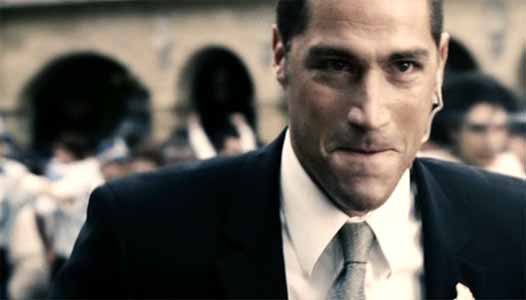|
Click here to return to the main site. Matthew Fox (Kent Taylor) - Vantage Point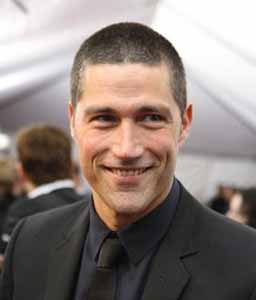 Matthew Fox was born on 14 July 1966. He played American football and majored in Economics at Columbia University, with the intention to end up on Wall Street. His girlfriend's mother at the time was a modeling agent who convinced him to try some modeling which led to a couple of TV commercials. HIs first major role was playing Charlie Salinger on Party of Five in the 1990s. He's best known to fans of Lost as Jack Shephard. ReviewGraveyard caught up with Fox as his first major film, Vantage Point, was due for release on DVD... ReviewGraveyard: What are the batteries for? [Fox has a huge stack of batteries on the table]
RG: What are you listening to at the moment? MF: All over, but you know right now I’m listening to a lot of The National, Band Of Horses, the new Radiohead is really good and I’m loving that. RG: Did you pay for it, did you download it? MF: No I waited until it came out on vinyl and CD actually. RG: Did you share any musical preferences with Dennis Quaid? MF: No, we didn’t. We were so focused on the work. We hung out a bit, all of us down there. It was cool. It was amazing to work with this cast and to be in the film with them was exciting for me. One of the first films I remember going to see at the movie theatre when I was younger that made an impression on me was Body Heat. And so for me all this time later to find myself playing a secret service agent in an elite team in the protection of the President played by William Hurt was really cool. I enjoyed very much the process of making the movie. RG: You say when you were younger you saw it. Did you sneak in under age?
RG: And this is not the lead role but it’s a key role. Did you have any reservations about being in a massive TV series and then taking an ensemble role? MF: No, I don’t really ever think about that at all. For me the role is never really the first way into a project. It’s always about the whole project, the entirety of the film and the potential of the film to be something really interesting. I think when making films the director is probably the biggest piece of the pie of all the elements that vaguely come together in some way to where you feel compelled to pursue the project, to accept an offer. And then the role comes after the director has said this is how I’d like you to serve the story and then you get to work on bringing yourself to it the best you can. RG: So what form does the script take? Because the structure of the film is quite specific - the script is not linear. How was it broken down and how was it presented to you initially? MF: The structure of the film... It was one of those reads that was a difficult read. It was well executed and it felt very original and had this theme of perspective running through it which I find personally pretty fascinating.
And when I saw the movie, I was really happy with how it all turned out. Pete Travis, I think, is just a really, really smart, very dedicated director. I love the movie that he did before this, Omagh, and I remember it’s the first time thinking this is someone I really want to work with because he’s going to make a really cool film out of it. RG: How did you enjoy the Secret Service boot camp and what did it entail? MF: We had consultants on the film so it was really more of a daily basis thing for me of having somebody there. It was always very important to Pete and Dennis and I and everybody who was playing the Secret Service roles within the film to make sure we got the logistics of how that would go down. And then for Dennis and I and Pete we really wanted to spend some time talking about what the history between these two guys might be, so that we could make some of the things that happen later a little more powerful. I mean it’s an action thriller too so it’s a really intense ride but we wanted to try and find the opportunities within that to try to make things heavier. RG: Is it easy for you to get your head into the place of a character who ostensibly is prepared to take a bullet for the President? Is that something you can understand, what it takes to be that sort of person? MF: I did think just in general terms of a Secret Service agent that I have a lot of respect for that kind of focus. I mean that’s serious focus on what you’re doing there and some serious dedication and I have a lot of respect for that. RG: How does your commitment to a long-running TV series like Lost affect your ability to pick and choose film roles? It must be quite limiting in a way.
So, at the same time, there are sometimes opportunities that I can’t be a part of and I wish I could but then I’m also well aware that the very thing that’s helping fuel that has gotta be my number one priority right now. RG: Could you suggest they delay a couple of weeks? MF: Well yeah, they’ve done that. I shot Speed Racer last summer in Berlin with the Wachowski brothers and there was a three-week overlap between the Speed Racer schedule and the Lost schedule and Touchstone and Damon Lindelof and Carlton Cuse and everybody over at Lost really wanted me to have the opportunity to be a part of that film and they restructured the shooting of the year so that I could come back two weeks later than everybody else, which I’m very grateful for.
MF: Yeah, now that we know that we’ve got this set number of chapters left and Damon can finally actually plan out how he wants... he’s always had this story and now he can actually map out how that’s going to go. I do have some ideas, I have some imagery that he’s mentioned to me... RG: Can you tell us more? MF: I can’t. A truck would pull up to this hotel and guys would jump out with machine guns and I’d be out of here in three seconds flat. RG: Is that one of the problems with Lost? You must get badgered for information all the time, not just by journalists... MF: I do. But honestly I think that the audience for Lost is bright and curious and very, very dedicated and passionate about the story and in general they don’t really want to know. They’re smart enough to know that... they’re going to ask the question but they don’t really want to know because they’re... when I’m reading a really great book I’m the last person in the world to turn to the end to find out what’s happening. I’ll only let myself read another chapter and savour the experience of a really good read and I think that’s the experience of Lost. RG: Do people find you quite approachable, do you get a lot of people coming up to you?
RG: Was being directed by the Wachowski brothers a very different experience? MF: It was fantastic! Absolutely fantastic. I can’t say enough about them as creative minds and as people. The movie is going to be so different to anything we’ve seen and sort of traditional everything goes out the window. The way the movie moves, the way that it was shot, the way it’s put together, it’s... I’m really excited for that. Q: Have you been surprised by the way your character develops and the story develops in Lostor can you anticipate it? MF: No, I’m always very surprised. Damon [Damon Lindelof, co-creator of Lost] and I talk about Jack a lot. And in talking about Jack you end up talking about the story. So there are things that I’m prepared for. Like last spring he called me pretty far in advance on the flash-forward situation. And obviously he felt he had to fill me in on what that year of Jack’s life was like. He had to close the period of time from him feeling like he was getting off the island to his future where he’s suicidal and he’s desperate to go back. And that was such a huge surprise to me and such a good thing for the show I think and a really smart move on his part. I think it’s really opened up what the show’s going to be for the next three 16-episode seasons.
MF: I’d love to take credit for the chase sequence, for the car chase, I wish I could do that driving. [Laughs] RG: Were you in the car? MF: I was in the car for certain scenes in that, but when it really gets intense, no. Most of that is done actually on green screen for me - the close-up reactions, with a couple of guys rocking the car and Pete telling me what I was reacting to through the windshield of the car. It was the one moment in the shooting of the film that I was very frustrated with that process and I was like: "It’s not going to work!" And he said: "Trust me, it’s going to work great." I’ve been travelling all of the world talking to people about this movie and they’re all talking about how great the fricking car sequence is! [Laughs] Pete was right. RG: What you said earlier about being drawn to interesting or challenging projects, does it very subtly imply the path the character in this film takes. Do you have people around you suggesting that you need to play the good guy in other things? Just maintaining an image. Are you going to struggle in that sense?
You know Lost’s Jack Shephard could have been a very clichéd knight in shining armour-type heroic role which would have been very boring and uninteresting for me to play and for the audience to watch. Damon and I always wanted to play him as a guy who’s sort of cast in the cliché idea by a group of people on this island who are desperate for something like that and that he really falls short of it and is actually very flawed and then the island starts to erode the edges of what was a compassionate doctor and leading him down a darker path. And that’s interesting to me and I think it’s more interesting to the audience too. RG: How do you feel about a future without Lost? MF: This has been an amazing experience for me so I’m going to really try to savour the next few seasons of shooting the show and then I think I’ll be ready to move on to different things. I don’t think I’ll do television again, only in that I think some of the best writing is happening on television so the only reason why I say that is that I think it’s much easier for me to have more control over what my year looks like if I’m doing films. I’d love to sort of contain the experience of doing films. You sign on to do this particular story, you spend three or four months really dedicated and focused on that one experience and then it’s done and you’re unemployed. And I can dictate how long I stay unemployed and really nurture the relationships in my life and then wait for that next thing that starts to build up and feel like I’m compelled to be a part of it. And it will just give me more control over what my year looks like, rather than having this six to nine months piece of work on one role that’s pretty time consuming.
MF: I think we’re all going to be excited to move on to the next stage of our lives. My daughter and my little boy have made some really great friends in Hawaii and when we do move on I think that’s going to be a tough moment for them. But we’re also going to be moving on to a place where they’re close to a lot of family, cousins and other relationships so they’ll make new, really cool friends where they’re heading and you know each one of these is a big chapter and that one is going to be one we move on from. We’re not going to stay in Hawaii I don’t think. RG: Is it difficult for your kids? MF: Yeah, they move around quite a bit. RG: Do they watch you on the TV? MF: No. When we were an eight o’clock show and my daughter was 10 or 11 then I would have been alright with it. But we’re a 10 o’clock show now and it’s a harder show. I think that’s good for the show, I think with the themes that we’re dealing with that’s good.
RG: If I could take you back to Body Heat for a moment, how serious was your career as an actor on your radar? MF: Oh, at that time it wasn’t even a figment of my imagination. That didn’t start happening for me until I was graduating from college. In fact I was studying economics and got my degree and was actually convinced that I was going to go and work on Wall Street. I did one interview and decided that that was going to be a disaster [Laughs] and so the idea of acting was actually just a default like a fall off of other ideas. Q: It turned out quite well... MF: It’s been a ride! [Laughs] RG: Thank you for your time.
Vantage Point is released on DVD and Blu-ray from Sony Pictures Home Entertainment from 04 August 2008. Click here to buy Vantage Point on DVD for £9.98 (RRP: £19.99) Click here to buy Vantage Point on Blu-ray for £17.98 (RRP: £24.99) Click here to buy Vantage Point on UMD for £8.30 (RRP: £12.99) Return to... |
|---|
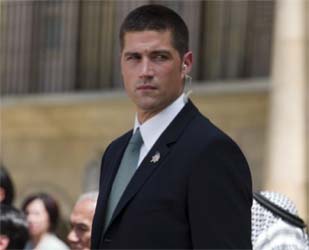 Matthew Fox: Because my headset... I listen to music constantly and my batteries shut down while I was playing so I had to get some new batteries. And I asked for one and I got this many.
Matthew Fox: Because my headset... I listen to music constantly and my batteries shut down while I was playing so I had to get some new batteries. And I asked for one and I got this many.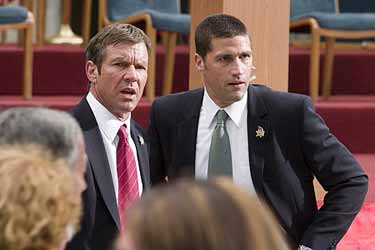 MF: Yeah, I think so. [Laughs] I think I was probably 15 or 16 when I saw it.
MF: Yeah, I think so. [Laughs] I think I was probably 15 or 16 when I saw it.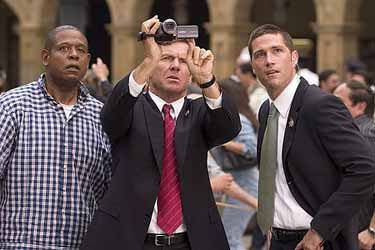 I think about it a lot in my life, just how different things can look to different parties, depending on who they are and where they’re standing and how they want to perceive it. But the actual structure of the script was pretty straight through. It began with the event and the retelling of the event through these different perspectives. But you also knew that it was the kind of project that was going to be a very intense experience, because there’s almost an infinite amount of ways that you can end up structuring the film, there’s so many ways that you could have done it.
I think about it a lot in my life, just how different things can look to different parties, depending on who they are and where they’re standing and how they want to perceive it. But the actual structure of the script was pretty straight through. It began with the event and the retelling of the event through these different perspectives. But you also knew that it was the kind of project that was going to be a very intense experience, because there’s almost an infinite amount of ways that you can end up structuring the film, there’s so many ways that you could have done it.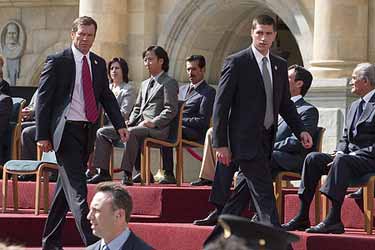 We choreographed those sequences the same way that they would choreograph them. And it is very choreographed and very specific. And so we had somebody there to ask questions of all the time, all the way from the way weapons were carried, the way communications were handled and the positional references - people around the President.
We choreographed those sequences the same way that they would choreograph them. And it is very choreographed and very specific. And so we had somebody there to ask questions of all the time, all the way from the way weapons were carried, the way communications were handled and the positional references - people around the President.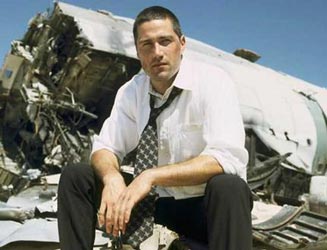 MF: Yeah, there are times when it’s frustrating because Lost will take up a big chunk of the year for me, but at the same time Lost is a big reason why I’m getting all these opportunities. So I’m grateful towards what the global success of the show has done for me personally. And it’s definitely a big reason why I’m getting the opportunity to work with this calibre of directors on these kinds of films and with these kinds of casts.
MF: Yeah, there are times when it’s frustrating because Lost will take up a big chunk of the year for me, but at the same time Lost is a big reason why I’m getting all these opportunities. So I’m grateful towards what the global success of the show has done for me personally. And it’s definitely a big reason why I’m getting the opportunity to work with this calibre of directors on these kinds of films and with these kinds of casts.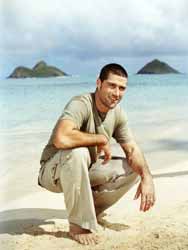
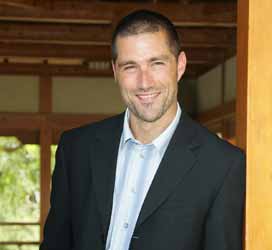 MF: I don’t. I feel like people sort of noticing me walking around but I don’t feel like it’s ever really intrusive. People really try to find certain moments to go: "Hey, I’m a huge fan" or maybe make a joke about how they want to know what’s happening on Lost. But no, I don’t really feel that because... this is the second TV series that I’m going to end up being on for six years - I don’t feel people especially feel close or are able to jump into my space because of that.
MF: I don’t. I feel like people sort of noticing me walking around but I don’t feel like it’s ever really intrusive. People really try to find certain moments to go: "Hey, I’m a huge fan" or maybe make a joke about how they want to know what’s happening on Lost. But no, I don’t really feel that because... this is the second TV series that I’m going to end up being on for six years - I don’t feel people especially feel close or are able to jump into my space because of that.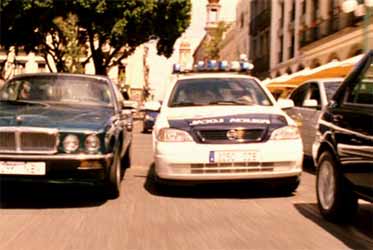
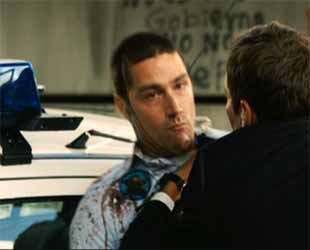 MF: Up to this point I’ve never ever really thought at all about some image outside there that is in some way dictating the choices that I make. Never. I just don’t think about it that way. I don’t know... I mean I guess it’s important that the characters are kind of likeable but I don’t ever really think I intentionally try to play them.
MF: Up to this point I’ve never ever really thought at all about some image outside there that is in some way dictating the choices that I make. Never. I just don’t think about it that way. I don’t know... I mean I guess it’s important that the characters are kind of likeable but I don’t ever really think I intentionally try to play them.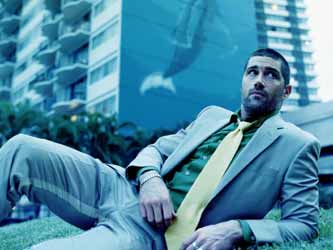 RG: Will your family be relieved when Lost finishes in terms of location and time commitments?
RG: Will your family be relieved when Lost finishes in terms of location and time commitments?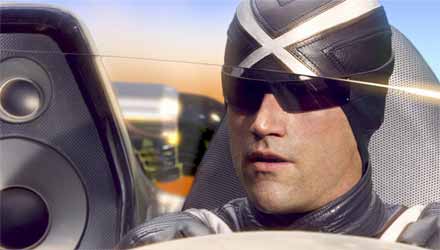 That’s one of the great things about being a part of Speed Racer was that it’s the first project I was going to be involved with that was really and truly a family picture. My kids are really excited and I can’t wait to go see that movie with them.
That’s one of the great things about being a part of Speed Racer was that it’s the first project I was going to be involved with that was really and truly a family picture. My kids are really excited and I can’t wait to go see that movie with them.